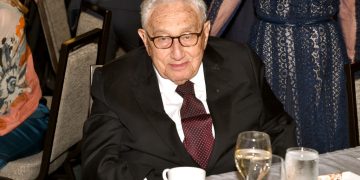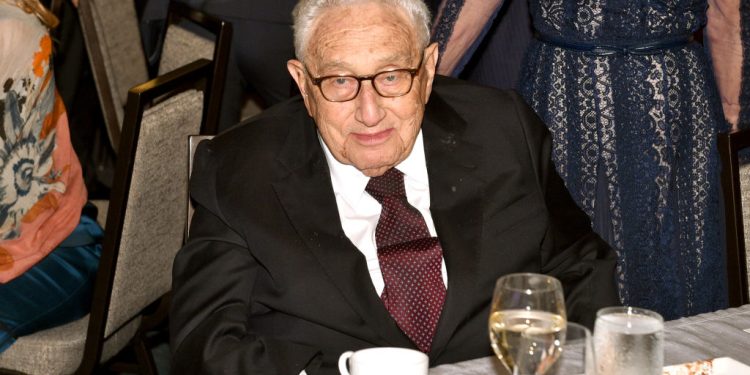Former U.S. Secretary of State Henry Kissinger died at the age of 100.
The news of his death was announced via a news release by Kissinger Associates, his consulting firm, on Wednesday.
“Dr. Henry Kissinger, a respected American scholar and statesman, died today at his home in Connecticut,” the news release said. No cause of death was given.
Kissinger was born in southern Germany in 1923. He fled Nazi Germany and moved to America with his family in 1938.
“After he became an American citizen in 1943, Dr. Kissinger served in the 84th Army Division from 1943 to 1946. He was awarded the Bronze Star for his ‘meritorious service,'” the news release continues.
Kissinger, deemed as “one of America’s great statesmen,” served in the Counter Intelligence Corps in Germany thereafter. He served in the U.S. Army Reserves until 1959.
Subsequently, he attended Harvard University where he earned his master’s, bachelor’s, and Ph.D. degrees. Kissinger, who was the author of 21 books on national security matters, also taught international relations at Harvard University for almost 20 years.
In 1969, former 37th President Richard Nixon appointed Kissinger as National Security Advisor. He served until 1975.
He then became Secretary of State under Nixon’s and former President Gerald Ford’s administrations from September 1973 to January 1977, per Britannica.
As the only person ever to be national security adviser and secretary of state at the same time, he exercised a control over U.S. foreign policy that has rarely been equaled by anyone who was not president, The Washington Post reported.
He was the last surviving member of President Richard Nixon’s Cabinet and the oldest living former U.S. Cabinet member, per People.
He was also recognized for his prominent role in negotiating the end of the Yom Kippur War in the Middle East, the opening to China, and helping lead America’s contribution to the end of the Vietnam War, according to the news release.
His famous “shuttle diplomacy” after the 1973 Middle East war helped stabilize relations between Israel and its Arab neighbors, per The Washington Post.
Additionally, Kissinger was awarded the Nobel Peace Prize in 1973, per People.
He escaped the Watergate scandal that brought an end to Nixon’s presidency. Kissinger continued to wield influence in the waning days of the administration. “You have saved this country, Mr. President,” he was heard telling Nixon in an April 1973 White House tape. “The history books will show that, when no one will know what Watergate means,” Politico reported.
In 2021, Kissinger sat down with Axel Springer CEO Mathias Döpfner in an interview and revealed his deep affection for Germany despite fleeing the country as a child.
“I don’t know if I have ever formally addressed this issue. My family suffered more than I did because I was younger. Despite the losses of close relatives and friends, my father always retained a nostalgic feeling for Germany,” he explained.
He continued, “In 1965, I received an award from the city of Fürth, and my father came along. To my amazement, he chose to volunteer an extremely conciliatory speech in German emphasizing the positive things he remembered. I never really explored with him how he reached that decision.”
Furthermore, Kissinger said he realized “that if it was wrong to treat Jews on the basis of their ethnicity then it was wrong to do that to Germans. too,” when he was a young man “who had been entrusted with great powers” at the end of the war.
“And, by serving in Germany, I had an opportunity to start to work on a new relationship,” he said.
Kissinger added, “And it evolved into an important part of my life.”


























 Continue with Google
Continue with Google